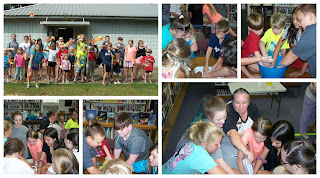On Wednesday, June 19, Branch Manager Dianne McLaurin was invited to speak to the local Rotary Club on behalf of the Forest Public Library. Some of the members asked for a copy of the speech to be shared online, so this post features excerpts from that speech.
"Today, I would like to speak on the relevance of the public library. I would like to begin with a quote from Steve Jobs:
Create relevance, not awareness. Now, I would like to follow that quote with two questions: Number 1 - How many of you are aware that there is a Forest Public Library? (
Every hand in the room was raised.) Number 2 - How many of you consider the library a relevant part of your life? (
Two hands went up out of twenty.) Hmmm...big difference.
So what IS the difference between relevance and awareness? We have established that everyone is aware that there is a library in Forest; it covers a city block! However, we have also established that it is not relevant to everyone in Forest, not even to everyone in this room. Why is that? Because relevance is associated with anything that is considered significant, important, necessary, or current. Relevance means to be closely connected to or by association. Relevance changes based on contemporary interests and current circumstances of a changing world. Relevance is not awareness.
You see, banks are relevant. Everyone needs a checking account or a loan at some point, so the main goal is to attract new customers. A fire department is relevant, especially if your house is on fire. But, how does the public library become relevant? The library might not be considered necessary like the police department, but can it be significant, important, and current? Can the library be a place of connection that reflects the interests of a changing community? Is it possible to create relevance?
The staff at the Forest Public Library say yes, and we have several examples to support that answer. One of the most recent examples is the Teen Advisory Board scholarship awarded last month. As we began the process of pinpointing areas where the library was least relevant, the unanimous choice was the teen demographic...which was literally nonexistent. How could we make the library significant to jr. high and high school students? Only a few things signify to a teen, and at the top of that list is money. After meeting with the Friends of the Library and thanks to an anonymous donation, a $1000 senior scholarship was created. The required criteria for the scholarship was to plan and attend teen programs at the library, volunteer at the library, and recruit other teens to come to the library. At the beginning of the school year, the Friends' group hosted two senior breakfasts at Forest and Scott Central high schools, and the plans were set into motion. The outcomes were across the board increases in teen program attendance, YA (Young Adult) book circulation, and teen volunteer hours. The result was the beginning of relevance.
And here is another important observation -- relevance ripples. After the success of the TAB initiative, the staff began to see relevance in other areas. The Mississippi Library Commission included the TAB scholarship story in their state-wide newsletter, and the Mississippi Library Association chose the library's TAB initiative as one of their presentations for the annual conference. Not only is the library becoming relevant to the Forest teen community, but the library is also becoming relevant to the state library organizations.
So how is relevance not only created but sustained? By doing what I am doing today. By speaking at this Rotary Club meeting, by being selected as a recipient of a $500 Rotary donation to continue the scholarship program, by being seen as an integral part of any significant event in the Forest area, by serving on the Chamber of Commerce and Forest Community Arts, by attending K-6 end-of-school award ceremonies to promote the summer reading program, by experimenting with book drives and back door events, by securing business and organization partnerships, by supporting Scott County and Forest school districts, and by fostering demographic initiatives that include Hispanic, African American, and Asian populations.
For the hundreds of children who use the public computers for their homework assignments, the library is relevant. For the residents who need to send an important and timely fax, but do not have access to a fax machine, the library is relevant. For the college student who needs a proctor for an online course, the library is relevant, and for the student who needs tutoring after school to pass their 3rd grade state test, the library is relevant. And...for every present and future reader in the Forest area, the library is relevant."















